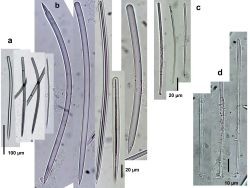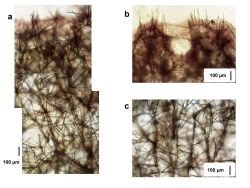yellow
brown
orange
cinnamon-tan
orange-yellow
branching
encrusting
lobate
massive
tube
crumbly
Bahamas
Colombia
Martinique
Netherland Antilles
Saint Eustatius
United States
Ectyoplasia ferox
Description: Thick encrustations with scattered oscules located on low, high (mound to volcano-like), or tubular projections; sometimes with upright lobes or branches. Cave specimens tend to be thickly encrusting. Size of specimens can reach 30 to 50 or more cm in diameter, and 1-5 cm in thickness, although tubular oscules, lobes or branches can reach up to 5-10 cm or even more. Oscular mound or tubes are often joined by ridges. Oscules are 3-5 mm in diameter, although could reach 1 cm in large tubes. Surface rugose, sometimes folded, especially in areas with strong currents, but usually smooth around oscules and in the top of tubes. Color mustard orange-yellow to orange, both externally (slightly darker) and internally. Cave specimens darker brown in the surface, having edges and oscular collars with lighter color. Consistency stiff but crumbly. Skeleton as ascending tracts of 1-3 spicules, up to 50 µm wide, separated by about 120-150 µm; spicules in tracts arranged in a plumose fashion, some almost in a perpendicular direction (echinating), interconnecting adyacent tracts. Tracts end at the surface in tufts, piercing the pinacoderm, which is organic, 100-200 µm thick. Spicules in two types: (1) structural styles, slightly to strongly curved, stout (thin developmental stages), often with a wide axial canal (especially in the Bahamas), with hastate to mammiform ends; there are a few oxeas, usually with uneven ends; size in material from the Bahamas 125-290 µm long and 3-11.8 µm wide (developmental stages from 1.8 µm); material from Colombia has larger spicules (up to 318 x 14.3 µm in oceanic Old Providence, to 347 x 14.7 µm and 399 x 23.7 µm in continental Santa Marta and Cartagena respectively, cf. Zea, 1987). (2) Acanthostyles, slightly curved, with smooth to slightly lobed head and perpendicular spines located mostly in the terminal half, being especially pronounced at the tip, which is usually blunt, 103-131 µm long and 2.5-3.7 µm wide in the Bahamas, up to 190 x 9.5 µm in Colombian localities.
Notes: This species lives from shallow rocky shores and reefs to deep reefs, exposed or on cave roofs and walls. Also found in lagoonal settings and in tidal channels. Its color, consistency and spicule complement make this species unmistakable among Caribbean sponges. Cave and overhanging wall specimens can be confusing but they are easily identified by the peculiar acanthostyles. Ectyoplasia ferox explicata described by Wiedenmayer (1977) from The Bahamas, with styles and oxea and lacking acanthostyles, is Dragmacidon sp., a species also pictured here. Hymeniacidon amphilecta de Laubenfels, 1936 is a junior synonym (see WPD).
Author Reference: (Duchassaing & Michelotti, 1864)
Link: World Porifera Database

![<i>Ectyoplasia ferox</i> <br />[Bahamas, San Salvador]](mini/00037/01180.jpg)
![<i>Ectyoplasia ferox</i> <br />[United States, Florida Keys]](mini/00094/01555.jpg)
![<i>Ectyoplasia ferox</i> <br />[Bahamas, Hogsty Reef]](mini/00075/01746.jpg)
![<i>Ectyoplasia ferox</i> <br />[Colombia, Islas del Rosario]](mini/00115/01923.jpg)
![<i>Ectyoplasia ferox</i> <br />[Colombia, Islas del Rosario]](mini/00115/01924.jpg)
![<i>Ectyoplasia ferox</i> <br />[Colombia, Santa Marta]](mini/00115/01927.jpg)
![<i>Ectyoplasia ferox</i> <br />[Colombia, Islas de San Bernardo]](mini/00115/01928.jpg)
![<i>Ectyoplasia ferox</i> <br />[Colombia, Islas de San Bernardo]](mini/00115/01929.jpg)
![<i>Ectyoplasia ferox</i> <br />[Colombia, Santa Marta]](mini/00115/01930.jpg)
![<i>Ectyoplasia ferox</i> <br />[United States, Florida Keys]](mini/00115/01938.jpg)

